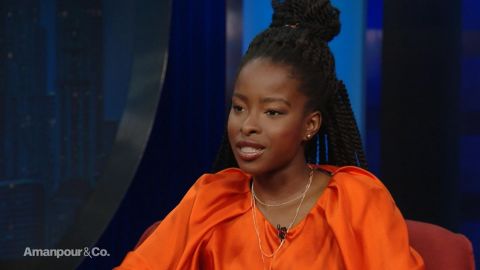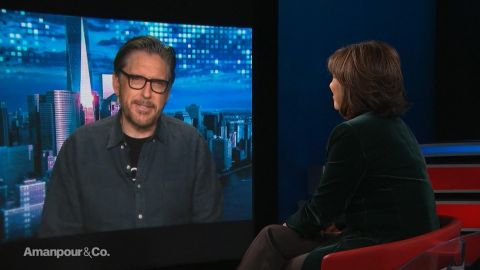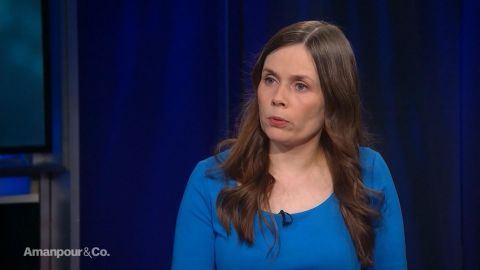Read Transcript EXPAND
CHRISTIANE AMANPOUR: Our next guest has also used her personal experiences to inform her writing. At only 21-years-old, Harvard student Amanda Gorman is already a published author and the first National Youth Poet Laureate. In this role, she’s spoken at the Library of Congress and all over America. She’s also an activist. She founded an initiative in her hometown, Los Angeles, to promote literacy through creative writing. Amanda sat down with our Alicia Menendez to discuss youth culture, her own poetry, and social justice.
ALICIA MENENDEZ: What’s so wild about your story is the leap from the way you grew up and the way you were treated in our education system to all of these accolades that you have acquired.
AMANDA GORMAN, YOUTH POET LAUREATE: Right. It was really wild. I remember when I first got the title, I was like if I could tell, you know, 7-year-old me, very skinny, has a speech impediment, terrified of reading her poetry, also continually because of the color of her skin, because of her gender, treated lesser than. If I could tell her that one day she’d have this type of role, my eyes probably would have rolled in the back of my head.
MENENDEZ: Well, you were dubbed a special needs student?
GORMAN: Right. I have a twin. And both my twin and I were born early. So that led to a few developmental delays. For me, the most kind of central of which in my life was that of having a speech impediment. And so what that kind of entailed for me is that I had to basically teach myself English and language in a way that my peers around me did not. But I think in the end, it made me a stronger poet because I had to work so hard to make that leap from someone who couldn’t say her last name or say the school in which she got into for college, to make that leap to being a Youth Poet Laureate performing at a place like Library of Congress. I think having that type of journey made me appreciate having the voice.
MENENDEZ: You have trouble with your Rs. Harvard is a cruel irony.
GORMAN: Yes, it’s a cruel irony. I can tell you that. I remember when I first got in, I like immediately whipped out the Harvard flash card with that word on it and was practicing it because I knew I’d have to tell people that’s where I was going.
MENENDEZ: Talk to me about the jump from writing your poetry down on paper to then becoming a spoken word poet and having to say those poems out loud.
GORMAN: Right. For me, it’s always — not only the question of is what I’m writing as powerful as it can be, and then there’s also the question of how am I going to physically perform this to someone who still to this day struggles heavily with sound with enunciation. And for me, it was a lot of practice makes perfect. Part of that included the flashcards of practicing words, but also interestingly enough something that I do sometimes to help me with my speech impediment is I will watch and listen to other great orators and try to embody them.
MENENDEZ: Like who?
GORMAN: Like Barack Obama who’s great. Martin Luther King, I’ll watch his speeches because he’s the phenomenal orator. But even like the cast of Hamilton, like there’s so many Rs in that. Aaron Burr, sir. And so I’ll practice that song before a performance and it really helps me work on what I need to work on.
MENENDEZ: Why poetry? How did you find poetry as your medium?
GORMAN: I think poetry really found me because it’s something that I’ve been doing since I could remember. I don’t remember a time before when I wasn’t fascinated by stories, fascinated by writings. I think a lot of us are first engaged at poetry in a classroom. It’s hot. Somebody is talking about Robert Frost. Poetry seems like this old artifact, “the land before time.” And for me, I think poetry is so exciting and so it’s bringing into those spaces and into those conversations that people traditionally do not connect the dots with.
MENENDEZ: Would you read me one of your poems?
GORMAN: Sure.
MENENDEZ: There’s one called “We the People” that I would love to hear, at least a piece of.
GORMAN: Yes. “We the People. We the people live in a less than perfect union that accuses the vulnerable and never the top class and race. When children are illegal and intolerance bans human, I wonder who we the people are in the first place. We the people meant all lives matter but all whites’ lives living coincidence when if you’re not male or pale, you get destroyed for demonstrating dissidence. When the color of a skin gets a killer assumed innocence, but still, we will rise up advocate and activate with the people’s diligence. Let’s speak names to we the people so they’re not lost in executive orders’ lines, protects them from prick, of tweet, pen, bullet or steeple. Sturdy our signs to keep making signs and reading the signs. It’s hectic, apocalyptic, the skeptics, but we can be united for what makes America great is diversity and democracy reignited.”
MENENDEZ: Wow. What specifically motivated you to write that poem?
GORMAN: This was kind of after the kind of big emotional psychological political shock that I had after Trump won the election. And I heard a lot of language around we the people about, you know, what the American democracy stands for. And I felt it was important to try to delineate the legacy of how much America has questioned who counts as the people, who counts as the populist of the democracy. That has not been anything that’s been stable and has not been something that’s been traditionally inclusive. And so trying to return to these words that we so often call forth in the American democracy and actually question what is its basis?
MENENDEZ: This is not your first foray into these questions. By the time you were 16, you were a community organizer. Can you tell me a little bit about that?
GORMAN: I’ve been an activist for a very long time. All of a sudden it became cool and hip to be a feminist. I remember being in class and the teacher asked if anyone was a feminist. I raised my hand and people looked at me like I was a psychopath. But around 16, that’s really when activism started kicking off for me. That’s when I started my community organization, “One Pen One Page.” And for me, what was critical about starting an organization such as that was not only to try to increase literacy through workshops, to giving this to underserved kids but it was to connect literacy to the project of democracy. To fundamentally see reading and writing as instruments for social change. And that was a type of lineage I really wanted to establish.
MENENDEZ: When you go to an institution as storied and as privileged as Harvard, what is the process of grappling, not just with the privilege you’re surrounded by, but also the privilege that you yourself now have?
GORMAN: Right. I think for a lot of students at Harvard, and I’ll just speak for myself, you arrive and all of a sudden you’re bestowed with a type of privilege that people around the world, you know, would give so much for. I remember a distinctive memory when I was walking past a wide library, which is this gorgeous library. And I was just seeing all of these tourists with their faces pressed against the glass. You know, it’s this moment of I’m the one behind the glass. I’m the one with the power that this line of children visiting want to have access to. And for me, it was a question of now that I’m here, now that I have this access, what am I going to do with it? And for me, it doesn’t just stop at my own education and my own degree. It’s taking the historical legacy of Harvard and what it represents and the type of power that it holds and then translating that into my own work as an activist in the library.
MENENDEZ: You often get called the voice of a generation, which I would contend with a generation this diverse and large, there can be no single voice of a generation.
GORMAN: Yes, exactly.
MENENDEZ: What do you think your generation gets right about advocacy and what do they get wrong?
GORMAN: I love as we call it Gen Z because they’re relentless and they’re highly critical. For example, especially now in the age of social media, we’re very good at catching false activism for what it is. For example, the word feminism has been commercialized to the point that it’s on t-shirts, it’s on pens. But the money that you spend for those types of objects and commercialism doesn’t always go back to the cause. And I feel that Gen Z is very good at catching those types of false inserts of activism into that type of sphere. Case in point, the Pepsi commercial.
MENENDEZ: You mean the one with Kendall Jenner?
GORMAN: Exactly. The Pepsi commercial with Kendall Jenner, somehow it protested scenes because she has a bottle of Pepsi. If only one with the chain would have known, that’s all he needed to be. And so that’s a case in point where I think we are very adept at recognizing profound activism when it’s there and when it’s not. One thing that I think we could improve on is understanding historical context in legacy. For example, Gen Z, millennials, feminists, all love to use the word intersectionality. It is the buzz word.
MENENDEZ: The word of the moment.
GORMAN: The word of the moment. And this fascinates me because I will actually go to Google trends data and look at when the use of intersectionality spikes. It always happens, of course in the women’s march, but the thing is historically the word intersectionality has been here since 1989 from Kimberly Crenshaw, an amazing scholar who first coins the term. But I can tell you a lot of the times if you’re talking with not only Gen Z but other age groups about intersectionality, they might not be as aware of that type of history and what the word was used for originally. And I think it’s important not just because I’m a nerd and I like history, but because if we’re not on the same page of the words that we’re using to build a movement, how then are we going to use those words to help the movement succeed? I love the speech by Abraham Lincoln where he basically says “By freedom, we do not all mean the same thing. By feminism, we do not all mean the same thing. By intersectionality, we do not all mean the same thing.”
MENENDEZ: I want you to read another poem.
GORMAN: OK.
MENENDEZ: This one is called “We Rise”.
GORMAN: This one I wrote the day that Dr. Ford gave her testimony.
“It’s no longer fearing because while there’s a lot to lose, for once, this we choose. There’s a lot at stake, but making a difference always takes great courage so we choose to encourage a woman who dares stare fear square in its face. Somewhere, someplace, someone might have used violence to silence a woman’s screams. But now it seems he can’t quiet his own when the truth is shown. Because when one woman stands, she is never alone. Change is achieved when we believe survivors. Because lies can’t survive their spirit and believers when they hear it. We’ve all heard the game of “she said, he said.” But today we came to let it be said that lights will be shed when a country is led by survivors of all genders who engender not to keep the truth a secret but who have the courage to speak it. We’ll respect her not just because we list her as a man’s sister, daughter, niece, wife, but because she’s simply someone. A life. We respect a woman’s truth not because we know her in such but because we owe her that much.”
MENENDEZ: We talk a lot, especially most of our guests are older than you are, about how Me Too has trickled down into the workplace. But I wonder what the conversation looks like on college campuses?
GORMAN: For so long, sex-based, gender-based of violence has kind of been seen as mutually inclusive with the college experience. Meaning that it’s the danger of employment as a student in that space. And with Me Too, I think we’re seeing this ferocious and also justified critique that no, it should not be normally expected in my college experience, that this amount of women will go and experience some type of sexual-based violence. That is unacceptable and that is horrendous. Particularly at Harvard, there’s been a couple of steps that have been taken to ensure that Title IX is being upheld. I think a lot of that work happens with administrations but also with students demanding more from the people in power at the educational institutions.
MENENDEZ: Do you feel like other people take you as seriously and your ideas as seriously as you take yourself?
GORMAN: Some people. And some people, no. For example, I think it’s interesting because once you get a title like you’re the Poet Laureate of the United States, you might think that an orb of, you know, this golden orb surrounds you and people respect you for your work and for what you do. It’s not always the case. Especially when I’m in rooms with white men where people ask me if I want to make it as a poet. I’m like, what do you mean make it? Am I not a poet right now? I’ve been told by white men in my classes that my writing is too confident, et cetera, et cetera but —
MENENDEZ: Wait, wait. Stop. Too confident?
GORMAN: Too confident. That’s what I said. And I leaned back and I’m like, this is a workshop on poetry, not on my character.
MENENDEZ: What do you believe that too confident is code for?
GORMAN: Too confident is code for I’m not comfortable for a black woman who is using her voice with a pen to be existing in the same classroom. That’s what it was code for. But what I did is — this is a tip I have for any woman who’s in that type of space. When something like that pops out of a man’s mouth and he doesn’t realize that it’s trash, you just ask questions. You don’t say anything. You don’t call him out for it at first. I just said “what do you mean by it’s too confident?” And he goes, “Well” and keeps stuttering. And you just keep asking questions and by three “what do you mean by that” and he leans back and he goes, “You know what? Never mind. What I said was kind of idiotic.” And I was like, yes, it was.
MENENDEZ: You have previously stated that you intend to run for president in 2036?
GORMAN: Yes, correct.
MENENDEZ: Still the plan?
GORMAN: Still the plan. I just thought if I start the campaign now, by the time we get there, a lot of the heavy lifting would have been done. So I’m thinking of like hashtags which might be like #commandainchief. I’m still working on them.
MENENDEZ: I wonder though, when you first said that, did you — I think the people thought would be further along in 2020 than we’re finding ourselves. Do you think that that gap will close between now and 2036 for you specifically as a woman of color?
GORMAN: I think the gap is already closing. And it’s difficult to numericize it. Because until we have someone in the White House who identifies as a woman, it will always, once you — if you can’t see it, you can’t imagine it. So we’re at this tipping point where we don’t have something to visualize and then project. But I can tell you we have a woman president coming soon. And I think once we reach that, it will be the tipping point. All of a sudden, we’ll have girls around the country who will see an image that they can identify and that it will make the gap all the smaller.
MENENDEZ: Amanda, thank you so much.
GORMAN: Thank you so much for having me.
MENENDEZ: Thank you.
About This Episode EXPAND
Christiane Amanpour speaks with Katrín Jakobsdóttir, the Icelandic Prime Minister; and Craig Ferguson, late-night TV host and author of “Riding the Elephant.” Alicia Menendez speaks with Amanda Gorman, the first National Youth Poet Laureate.
LEARN MORE


